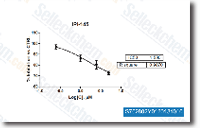Our research could be the very first to demon strate right that Akt activation is reduced when SR BI is knocked down or pharmacologically inhibited. More much more, in agreement with the previously mentioned research, we showed that proliferation of MDA MB 231 cells was considerably inhibited by downregulation of SR BI protein amounts and by pharmacologic inhibition of SR BI. Furthermore, we observed that SR BI knockdown inhibits migration. This obtaining may well propose a purpose for SR BI within the initiation of metastasis. Lastly, we demonstrated that knockdown of SR BI in MDA MB 231 cells can result in lowered tumor development in vivo accompanied by elevated activation of Erk1/2 and Akt, and a rise in cellular apoptosis. In MCF7 cells, knockdown of SR BI also led to lowered xenograft tumor development.
Earlier research have proven that Akt can inhibit apoptosis through several different mechanisms, like the phosphorylation of Negative, hence stopping read full report cytochrome c release from mitochondria as well as the direct inhibition from the caspase activation cascade. Increased cellular choles terol levels are shown to increase Akt activation and reduce apoptosis in prostate cancer cells. Con sistent with these observations, a current research showed that inhibition of xenograft tumor growth may very well be accomplished with colon cancer cells that re express the ATP binding cassette transporter A1. ABCA1 is usually a lipid transporter that mediates the efflux of cellular cholesterol to lipid cost-free apolipoprotein A I. In addition, in this examine, re expression of ABCA1 resulted in decreased mitochondrial cholesterol articles and elevated release of cytochrome c, which eventually led to greater apoptosis. Our perform also indicated that SR BI knockdown can sig nificantly minimize apoptosis in xenograft tumors, as shown by TUNEL staining.
Consequently, a reduction during the ranges of cellular cholesterol written content might be responsible, at least in element, for selleck inhibitor the decreased apoptosis observed in our model. Taken together, these data also propose an im portant part for cholesterol inside the regulation of cellular signaling pathways and tumor formation. Importantly, ex cess cellular cholesterol accumulates within the kind of esteri fied cholesterol. Preceding works and ours recommend the accumulation of esterified cholesterol may cause a modification of signaling pathways associated with proliferation and migration in tumors. Consistent with this particular hypothesis, expanding cellular esterified choles terol levels happen to be shown to induce cellular prolifer ation and improve  invasiveness of tumor cell lines. Conversely, the inhibition of cholesterol esterification has become shown to possess the reverse result. Conclusions In summary, our outcomes suggest that HDL and SR BI have professional oncogenic action and might induce migration and acti vate signal transduction pathways accountable for cellular proliferation and tumor formation in two breast cancer cell lines.
invasiveness of tumor cell lines. Conversely, the inhibition of cholesterol esterification has become shown to possess the reverse result. Conclusions In summary, our outcomes suggest that HDL and SR BI have professional oncogenic action and might induce migration and acti vate signal transduction pathways accountable for cellular proliferation and tumor formation in two breast cancer cell lines.
Histamine Receptor Signaling
A class of G protein–coupled receptors which bind histamine as their primary endogenous ligand.
